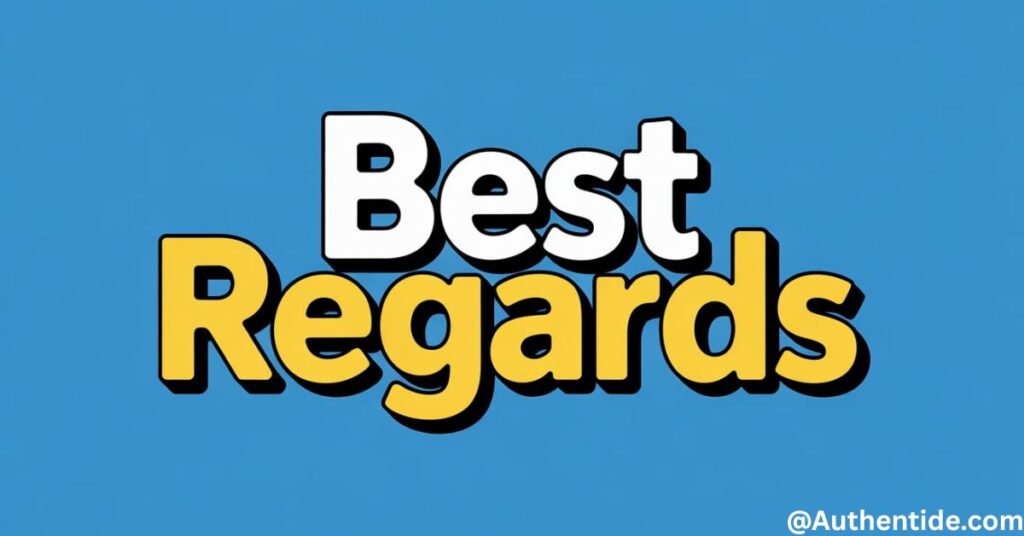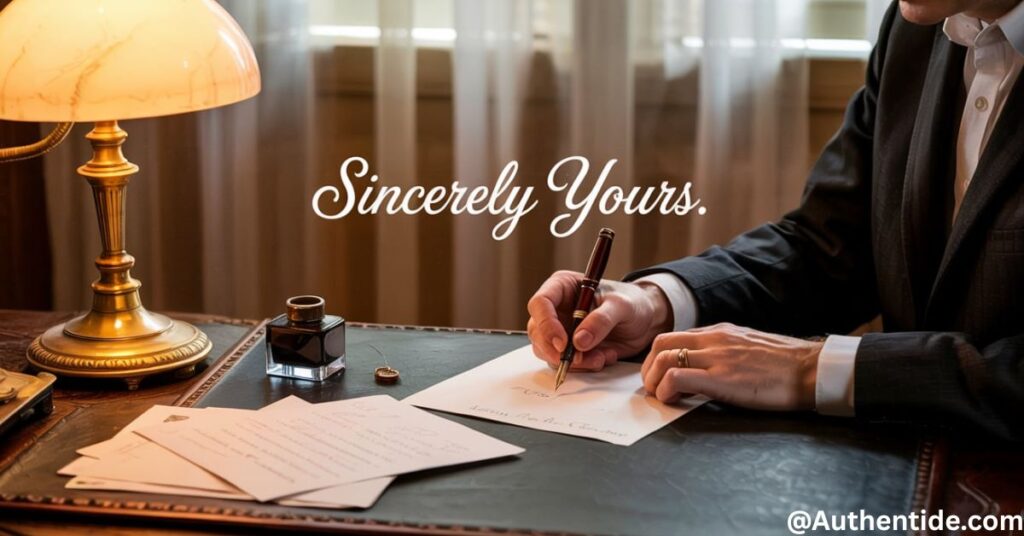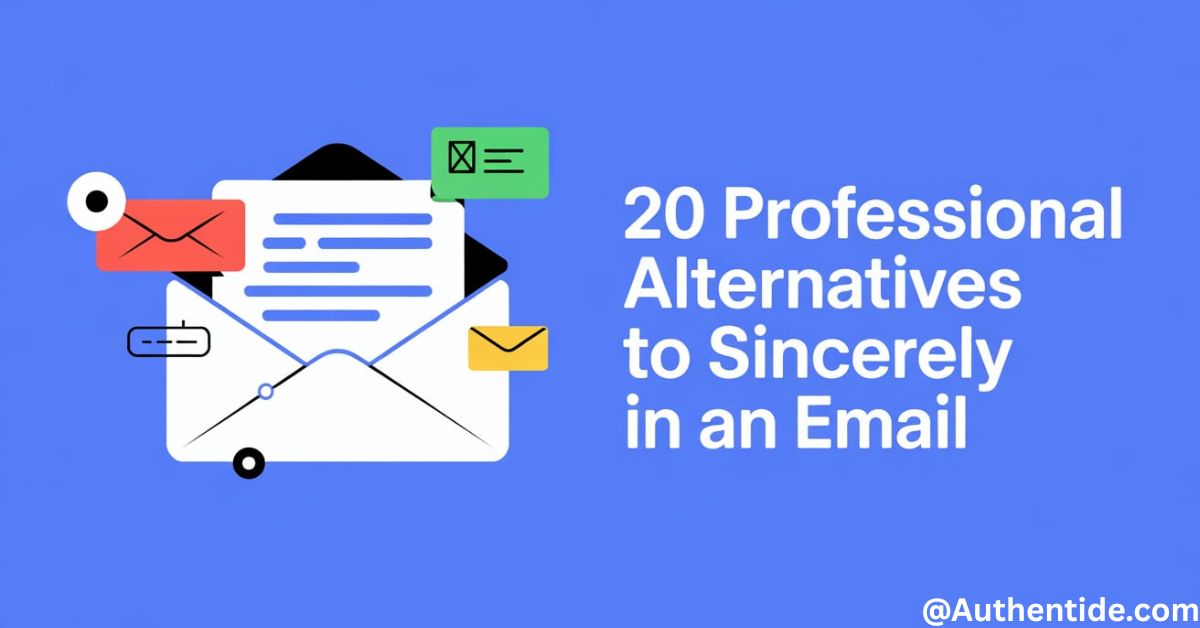Professional email communication demands finesse in every element, from the greeting to that final sign-off that leaves a lasting impression on your recipient. The traditional “Sincerely” has served as a reliable email closing for decades, but in today’s dynamic workplace, your email sign-offs deserve the same thoughtful consideration as the message itself. Whether you’re sending a job application, following up with a client, or corresponding with colleagues, how you conclude your message speaks volumes about your attention to detail and communication style.
The right closing phrase can transform an ordinary email into a memorable interaction, leaving your recipient with positive feelings about both your message and your professional brand. In fact, research suggests that email recipients often remember the closing line more vividly than the middle content of your message. With so many alternative phrases available beyond the standard “Sincerely,” why not expand your professional vocabulary and match your closing to the specific relationship and context?
This comprehensive guide explores twenty fresh, context-appropriate alternatives to “Sincerely” that will elevate your email communication and help you strike the perfect tone for every professional situation. From warm and appreciative closings for colleagues you know well, to respectful and formal options for executives or new contacts, these alternatives will help you navigate the nuanced world of professional tone in digital communication.
What to Say Instead of “Sincerely”
- Best Regards
- Kind Regards
- Warm Regards
- Best Wishes
- Respectfully
- Cordially
- Yours Truly
- Yours Faithfully
- Warmest Regards
- With Appreciation
- With Gratitude
- With Thanks
- All The Best
- Regards
- Many Thanks
- Thank You
- Looking Forward
- Sincerely Yours
- Best
- Respectfully Yours
Is It Professional to Say “Sincerely”?
Before diving into alternatives, let’s address the elephant in the inbox: Is “Sincerely” still considered professional? The short answer is yes, absolutely. “Sincerely” remains a classic, universally acceptable email closing that conveys respect and formality. It’s particularly appropriate for:
- First-time correspondence with new contacts
- Formal business letters
- Job applications and cover letters
- Communication with senior executives
- Customer service responses
However, using “Sincerely” for every email exchange can feel repetitive and impersonal, particularly in ongoing conversations or with colleagues you interact with regularly. The modern workplace values authentic communication that balances professionalism with personality. Just as you wouldn’t greet every person with an identical “Hello,” your email closings deserve thoughtful customization.
Think of email sign-offs as the digital equivalent of a handshake or parting gesture. The right closing signals your relationship with the recipient and the context of your exchange. A well-chosen alternative to “Sincerely” demonstrates attention to detail and social awareness – valuable professional qualities in any industry.
20 Professional Alternatives to “Sincerely” in Email Closings
Here are 20 Professional Alternatives to “Sincerely” in Email Closings”
1. Best Regards

“Best Regards” strikes an excellent balance between formality and warmth, making it one of the most versatile email sign-offs in professional settings. It conveys respect while maintaining a cordial tone.
Example scenario:
I've attached the completed quarterly report for your review, and I'm available to discuss the findings at your convenience.
Best regards,
Michael Chen
Pro tip: “Best Regards” works well in almost any professional situation but is particularly effective for regular business correspondence with colleagues across departments or organizations.
2. Kind Regards
Slightly warmer than “Best Regards,” this closing signals a friendly professional relationship while maintaining appropriate boundaries. It’s perfect for ongoing communications where you’ve established rapport.
Example scenario:
Thank you for providing the additional information about your project requirements. I've scheduled our kickoff meeting for Tuesday at 2 PM and will send calendar invitations shortly.
Kind regards,
Sophia Williams
Pro tip: This sincerely alternative adds a touch of warmth to routine communications without becoming overly casual – ideal for client relationships you’re nurturing.
3. Warm Regards
“Warm Regards” conveys genuine friendliness and is perfect for professional relationships where you’ve established a positive connection. It’s slightly more personal than “Kind Regards” but still maintains professionalism.
Example scenario:
I was delighted to hear about your recent promotion! Your dedication to the team has been inspirational, and this recognition is well-deserved.
Warm regards,
Jennifer Taylor
Pro tip: Save this closing for communications where you want to express genuine positivity or celebrate good news – using it too frequently might diminish its impact.
4. Best Wishes
This versatile closing works well for both professional and personal communications, making it ideal for workplace friendships or long-term professional relationships.
Example scenario:
Congratulations on completing the certification program! Your commitment to professional development sets a wonderful example for the entire department.
Best wishes,
Robert Johnson
Pro tip: “Best Wishes” pairs particularly well with congratulatory messages or emails that acknowledge personal milestones within a professional context.
5. Respectfully
When communicating with senior executives, government officials, or in highly formal situations, “Respectfully” conveys appropriate deference and professionalism.
Example scenario:
Thank you for considering my proposal regarding the organizational restructuring. I'm available to discuss the implementation timeline at your earliest convenience.
Respectfully,
Amanda Garcia
Pro tip: Reserve this sincerely synonym email closing for truly formal communications where hierarchy should be acknowledged – using it in routine emails might appear unnecessarily stiff.
6. Cordially

Elegant and slightly old-fashioned, “Cordially” conveys both warmth and professionalism. It’s excellent for client communications where you want to project sophistication.
Example scenario:
I've reviewed the contract amendments and find the terms acceptable. Please send the final version for signature by Friday, and we can proceed with the project launch as scheduled.
Cordially,
David Wilson
Pro tip: This closing works beautifully in industries like law, finance, and consulting where traditional formal emails are still the norm.
7. Yours Truly
Though traditional, “Yours Truly” retains its place in professional correspondence, particularly when you want to convey personal accountability or ownership of the message content.
Example scenario:
I personally guarantee that our team will deliver the completed project by the agreed deadline. My commitment to quality and timeliness remains unwavering.
Yours truly,
Thomas Edwards
Pro tip: This alternatives to sincerely works best when making promises or personal commitments in your message – it reinforces your personal stake in the matter.
8. Yours Faithfully
Common in British business communication, “Yours Faithfully” is traditionally used when you don’t know the recipient’s name and have addressed them as “Dear Sir/Madam.” However, it’s become acceptable in American business correspondence for formal situations.
Example scenario:
In response to your open position for Marketing Director, I am submitting my application with the attached resume and portfolio. My 15 years of experience align perfectly with your stated requirements.
Yours faithfully,
Katherine Morrison
Pro tip: This closing signals formality and respect, making it perfect for job applications and communication with organizations where you haven’t established a personal contact.
9. Warmest Regards
For professional relationships that have evolved into genuine connections, “Warmest Regards” conveys authentic appreciation while maintaining appropriate boundaries.
Example scenario:
It was a pleasure collaborating with your team on the charity fundraiser. Your dedication to the cause was truly inspiring, and I look forward to our next opportunity to work together.
Warmest regards,
James Wilson
Pro tip: Reserve this sincerely alternative for communications where you want to express genuine warmth – using it with new contacts might come across as presumptuous.
10. With Appreciation
When acknowledging help, support, or collaboration, “With Appreciation” explicitly communicates gratitude while maintaining professionalism.
Example scenario:
Thank you for taking the time to provide such detailed feedback on our proposal. Your insights have been invaluable in refining our approach to better serve your needs.
With appreciation,
Olivia Martinez
Pro tip: This closing works brilliantly when someone has gone above and beyond to assist you or provided exceptional service.
11. With Gratitude
Similar to “With Appreciation” but with a deeper emotional resonance, “With Gratitude” conveys heartfelt thanks for significant support or assistance.
Example scenario:
Your mentorship over the past year has been transformative for my career development. The guidance you've provided has helped me navigate challenging situations with confidence and clarity.
With gratitude,
Daniel Kim
Pro tip: Save this professional email closing for situations where someone has made a meaningful impact on your work or career – using it for routine interactions diminishes its sincerity.
12. With Thanks

Concise yet effective, “With Thanks” acknowledges assistance or collaboration without the formality of longer expressions of gratitude.
Example scenario:
I've received the updated project timeline and have shared it with our implementation team. We'll be ready to proceed on the revised schedule.
With thanks,
Laura Thompson
Pro tip: This closing works well for ongoing professional relationships where you’re regularly exchanging information or assistance.
13. All The Best
Friendly and positive, “All The Best” conveys good wishes while maintaining professional boundaries. It’s versatile enough for most business communication scenarios.
Example scenario:
I enjoyed our discussion about market trends during yesterday's conference. Your insights about emerging technologies were particularly thought-provoking.
All the best,
Richard Wong
Pro tip: This closing works well for follow-up emails after meetings or networking events – it’s friendly without presuming a close relationship.
14. Regards
Simple, classic, and universally accepted, “Regards” is the Swiss Army knife of email sign-offs – appropriate for virtually any professional situation.
Example scenario:
Please find attached the revised budget projections for Q3. I've highlighted the areas where we expect to see the most significant changes from previous forecasts.
Regards,
Emma Stevens
Pro tip: When in doubt about the appropriate level of formality, “Regards” is your safest option – it’s neither too warm nor too distant.
15. Many Thanks
This closing combines gratitude with a friendly tone, making it perfect for situations where you’re making requests or acknowledging assistance.
Example scenario:
Could you please forward the meeting minutes from yesterday's client presentation? I'd like to follow up on several action items discussed.
Many thanks,
Jonathan Pierce
Pro tip: This alternatives to sincerely works exceptionally well when you’re asking for something or following up on a request – it acknowledges the recipient’s time and effort.
16. Thank You
Direct and appreciative, “Thank You” works well when the primary purpose of your email is to express gratitude or acknowledge something the recipient has done.
Example scenario:
I wanted to express my appreciation for your presentation at yesterday's team meeting. The strategies you outlined for improving customer retention are exactly what we needed to hear.
Thank you,
Melissa Rodriguez
Pro tip: “Thank You” should primarily be used when the content of your email contains specific things you’re thanking the person for – otherwise, it might seem disconnected from your message.
17. Looking Forward
This forward-looking close is excellent for emails that require follow-up or anticipate future interaction.
Example scenario:
I've reviewed your proposal and would like to schedule a call next week to discuss implementation details. Please let me know your availability on Tuesday or Wednesday.
Looking forward,
Alexander Chen
Pro tip: This closing creates a sense of continuity in your professional communication, signaling that this email is part of an ongoing conversation rather than a standalone message.
18. Sincerely Yours

A slight variation on the traditional “Sincerely,” this closing adds a touch of personal connection while maintaining formality.
Example scenario:
Thank you for considering my application for the Senior Project Manager position. My decade of experience in agile methodologies aligns perfectly with your team's needs, and I'm excited about the possibility of contributing to your innovative projects.
Sincerely yours,
Natalie Washington
Pro tip: This works particularly well for job applications and other formal correspondence where you want to maintain professionalism while adding a personal touch.
19. Best
Concise and friendly, “Best” has become increasingly popular in workplace email communications. It’s casual enough for colleagues you know well but still appropriate for most professional contexts.
Example scenario:
I'll have the draft presentation ready for your review by tomorrow morning. Feel free to suggest any changes before our client meeting on Thursday.
Best,
Sarah Johnson
Pro tip: The brevity of this sincerely synonym email makes it perfect for quick, routine communications with colleagues and clients you interact with regularly.
20. Respectfully Yours
This formal closing conveys both respect and a personal connection, making it ideal for communications with senior executives or important clients.
Example scenario:
Following our discussion, I've prepared a comprehensive strategy to address the concerns raised about our market positioning. The attached document outlines both immediate actions and long-term recommendations.
Respectfully yours,
Benjamin Harper
Pro tip: Use this closing when you want to convey both deference and personal commitment – it works particularly well in situations where you’re providing recommendations or expertise to someone in a position of authority.
How to Choose the Right Email Closing
Selecting the appropriate email sign-off depends on several factors that contribute to effective respectful communication:
- Consider your relationship with the recipient. The closer your professional relationship, the warmer your closing can be.
- Assess the context of your communication. A job application requires more formality than a quick check-in with a colleague.
- Match the tone of your message. If your email is formal and detailed, your closing should reflect that same level of formality.
- Think about cultural norms. Different industries and countries have varying expectations for formal emails.
- Be consistent within a single thread. Dramatically changing your closing in the same conversation might appear odd.
Pro tip: When in doubt, err on the side of formality, especially in new professional relationships. You can always adjust to a warmer tone as the relationship develops.
Final Thoughts on Email Closings
Your email closing is the final impression you leave with your reader – make it count. The right sincerely alternative can reinforce your message, strengthen professional relationships, and demonstrate your communication skills.
Remember that effective business communication evolves with relationships. The closing you use with a new client might differ significantly from what you use six months later after establishing rapport. Don’t be afraid to adapt your closing as relationships develop.
Most importantly, ensure your closing aligns with both your intention and the content of your message. A heartfelt “With appreciation” feels disconnected if your email contains no expression of thanks, just as a casual “Best” might seem inappropriate following formal contract negotiations.

Your go-to place for smart synonyms and celebrity updates. Muhammad Hassan Abid is dedicated to creating useful, engaging content that informs, inspires, and truly serves your curiosity

